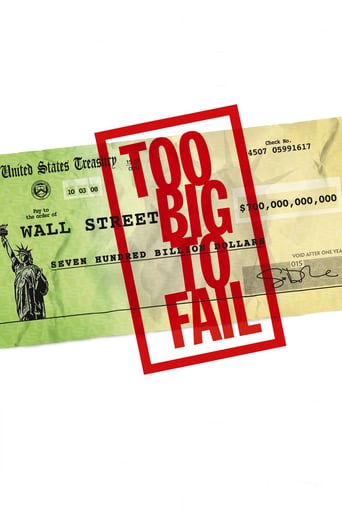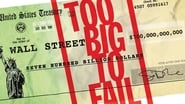TheSkyMaster
What I don't understand is, why the movie followed the Treasury Secretary? Why didn't it follow the Federal Reserve Chairman? Why did it show the Treasury Secretary talking and working with the Federal Reserve Bank of New York? Why Wouldn't the Federal Reserve Bank of New York's boss, the Federal Reserve Chairman, talk to and work with him? Also, the Federal Reserve Chairman spent his academic career studying the (previous) Great Depression. He would have the best understanding of what to do.
tiailds
There were portions of this movie that felt like this was a graphic novel adaptation of real events. The way some of the characters acted seemed far from realistic."Was it interesting?" For an explanation of the bailout from the inside out, this did well to explain everything. The few times when characters would summarize what has happened to someone were helpful but really out of place. These uninformed people really didn't understand everything that was going on or just how to explain it to the public? 2 out of 3."Was it memorable?" The actors did a great job impersonating their roles. The story seemed a little far fetched though.1.5 out of 3."Was it entertaining?" The movie did build suspense, and I never felt bored. Nothing jumps out either bad or good.1.5 out of 3.Starting with 1 (because of regulation), 1 + 2 + 1.5 + 1.5 = 6 A decent sit, but not one I will go out of my way to see again. William Hurt's performance actually had some emotion. Don't see that too often.
nikolaskjeldsen
HBO and Peter Gould did a disservice to the American people by stuffing their nose up the ass of Wall Street and the Federal Reserve bank by not even coming close to laying blame where it belongs. The film is almost comical in its representation of Paulsen, Bernanke and Geithner. All three of these clowns are characterized as heroic as they struggle to save the American economy from collapsing. The film is mostly fiction and is clearly an attempt to hide the truth from the American people. I would recommend watching a more truthful depiction of what actually happened, as for example "Inside Job" which is actually a documentary and not a fictional representation. This is all in all, nothing but propaganda.
roper1-110-4447
You can look at a movie like this two ways: as an accurate representation of the source and as a piece of drama. Too Big To Fail is not too big to fail on both counts.I should have known to expect with a cast that sports the likes of Ed Asner, but the degree of the left-wing Hollywood spin that they put on the story was stilling annoying. They just can't let go of a chance push their ant-business agenda, even if it means inventing new scenes and even directly contradicting the source book itself. Talking about painting the lilly! Exhibit #1: There was an invented scene about 2/3 of the way through the film apparently designed to explain the roots of the calamity. They throw around terms like CDO and CDS so fast that anyone unfamiliar with the book and the background to the financial crisis would have no clue what they were talking about. They then whitewash the home owners as victims, just poor dupes swindled by the unethical mortgage brokers. In reality, of course, many of these were greedy people living way beyond their means using their houses as piggy banks while many others were pure speculators. We don't hear anything blame about the likes of left wing heroes Barney Frank and Charles Shumer who lit the fuse on the whole mess by demanding that banks make mortgages available to the poor. There is not a word about the Quants whose unrealistic risk models told bankers that such a disaster could never happen. We don't hear about the corruption of the ratings agencies, collapse of the carry trade, etc. No, there is only room for one villain in the Hollywood left villain pantheon – big business CEO's.Exhibit #2: The ending is another invented scene that is thoroughly misleading. They have Paulson pleading that he hopes that the banks will lend out the TARP money as intended to stimulate the economy. Then there is a prologue saying that the banks didn't. This is pure rubbish. In the book, Sorkin makes it perfectly clear that this was not the purpose of TARP. It was to stabilize the financial world by injecting capital to deleverage the banks and to rebuild investor confidence. The banks could not lend money because it would push their leverage back up. But Hollywood isn't interested in what Sorkin said, if they can take another parting potshot at big business.Leftwing distortions aside, Too Big To Fail was simply very dull. For a while, it is amusing to see actors who look so much like their real-life counterparts, especially Paul Giamati as a Ben Bernanke clone and Evan Handler's amazing resemblance to Lloyd Blankfeld. But the characters are uniformly dull. Even scene that should be great theater (e. g., Paulson kneeling before Nancy Pelosi) come across a dead and perfunctory. The only breaking in the dullness is James Woods' way over the top portrayal of Dick Fuld. It bordered on comic relief.The book just didn't work as a movie. The book was a series of vignettes, whose complexity reflected the complexity of the actual crisis. The story lurches from vignette to vignette with not real plot or story developing. Further, the need to boil the book down into typical movie running time also meant that they drastically has to simply and shorten many of the events to the point of losing the real story. The collapse was not the kind of linear event that works on the screen.In sum, the movie fails as both history and as drama. A much better movie about the financial disaster could have been made from Michael Lewis's highly entertaining "The Big Short," that amusingly tells the story from the viewpoint of a few quirky Wall Street outsiders who saw the collapse coming and the problems that they encountered by running contrary to popular wisdom. It's the same story, but a lot more fun. But there would have been some sympathetic businessmen characters. The Hollywood lefties wouldn't want that.






